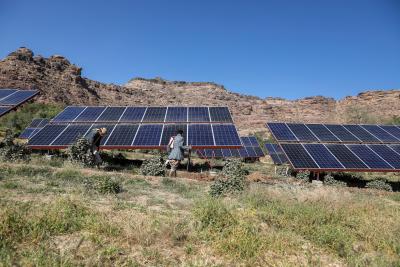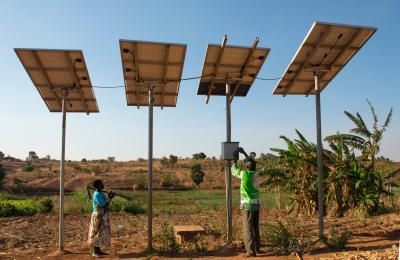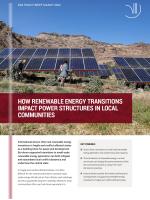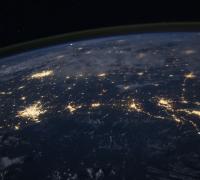How renewable energy transitions impact power structures in local communities

International donors often see renewable energy transitions in fragile and conflict-affected states as a building block for peace and development. But donor-supported transitions to small-scale renewable energy generation can both mitigate and exacerbate local conflict dynamics and undermine the central state.
In fragile and conflict-affected states, it is often difficult for the central authorities to protect large-scale energy infrastructure from attacks and sabotage, and thus guarantee long-term stability. Moreover, local communities often use fuel-driven generators to supplement the state-driven national grid, but national diesel supply lines are also vulnerable to disruptions. Consequently, international donors increasingly support small-scale renewable energy generation as a climate friendly alternative to centralised and state-led energy generation. Solar photovoltaic (PV) in particular has become a widely promoted, affordable and accessible technology for local energy generation.
Electrifying during conflict
Although conflict and internal instability can prevent the implementation of renewable energy projects, there have been instances where conflict has in fact facilitated transitions to renewable energy. Even in states with oil or gas reserves, these are often geographically centred in specific areas of the country, making it hard to utilise these resources during conflict. This can make renewable energy transitions an attractive alternative for households and communities as it allows them to generate electricity locally.
For example, in Yemen the onset of the ongoing Saudi-led intervention in 2015 led to soaring fuel prices while the national power grid shut down. The result was an increase in sales of solar panels of about 2,000 percent. Consequently, the percentage of urban and rural households with access to small-scale solar energy has gone from negligible in 2015 to a majority of households. But the move towards decentralised renewable energy generation has implications for national and local governance structures.
Outsourcing electricity
It is fundamental for the state to be able to secure access to electricity to all citizens throughout its territory. Hence, the expansion of electricity continues to play a central role in the expansion of the state to rural communities in countries around the world. The private sector depends on electricity to thrive and key public sectors, such as health and education, depend on electricity to function properly. The (re)establishment of electricity is therefore key for public service provision, supporting the economy and building overall confidence in the authority of the state.
However, in fragile and conflict-affected states, and with the introduction of small-scale solar PV technology, the creation of functioning electricity infrastructure is increasingly outsourced to private actors. Particularly, international donors such as the World Bank, UNDP and the EU have taken the lead in enabling households to acquire solar panels in contexts that are unfavourable to private investors.
International donors see supporting renewable energy transitions as a way of achieving multiple ends. It demonstrates a contribution to the goal of mitigating climate change, while being a cheaper and less demanding way to increase electricity supply in fragile and conflict-affected states. This effort initially focused on investment in solar panels. Increasingly it centres on the need for sustainable programming which prioritises designs with low running costs, the availability of spare parts and the training of maintainers. This shift in focus is particularly important in interventions targeting remote or hard to access villages.

Focusing on the local level
When donors (either directly or indirectly through a professionalised NGO) are spear-heading energy transitions, they often circumvent local state officials. Local state officials have an important function in mediating access to centralised electricity supply, but this role is undermined when local communities (re)orient themselves towards international donors rather than the central state. This process accentuates and worsens the state’s ineptitude as it becomes ever more immaterial in the lives of local communities.
Donors become gatekeepers not only of access to electricity, but also of political power distribution. At the same time, due to the absence of a functioning central state, a decentralised introduction of renewable energy lacks overall coordination and regulation. Research has identified the lack of capable national institutions responsible for environmental protection and resource management as a cause of local consternation.
Community cohesion
Donor’s main interlocutors for the introduction of small-scale renewable energy are local communities. This can increase ownership and build local capacity, but it can also feed intra-community dissent over priorities. Research has shown that there is a risk of local elite actors hijacking donor-supported projects. The most powerful actors use control over access to electricity generation, by acting as gatekeepers for access to electricity for individual households in the community, to further strengthen their control over local communities.
Additionally, the unregulated introduction of renewable energy can have negative spill-over effects on the environment. An example is if wealthy landowners use solar panels to operate more powerful pumps and deeper wells for irrigation. In contrast to diesel-powered generators, solar panels have low running costs, which means farmers can expand their irrigation systems considerably at little extra cost once solar panels are installed.
In this way, unregulated promotion of solar panels can lead to over-abstraction of groundwater and thus cause conflicts over access to water in the local community. Indeed, acquiring solar panels is not just about electricity, but also about entitlements, power and connections.
Renewable energy transforms societies
The renewable energy sector is now growing faster than the fossil fuel sector. In fragile and conflict-affected states this is driven by small-scale renewable energy generation that has limited infrastructure costs and fewer vulnerabilities than large state-led projects. This is not just a shift in energy generation but a change that transforms societies.
By changing electricity generation and consumption patterns, social and political structures are affected at both the local and national level. In sum, energy transitions are potentially radical transformations of societies which can both mitigate and exacerbate local and national conflict dynamics. While the introduction of renewable energy generation is an important response to climate change, it is necessary to analyse and navigate how its introduction impacts these challenges and opportunities to achieve just and peaceful energy transitions.
DIIS Experts





